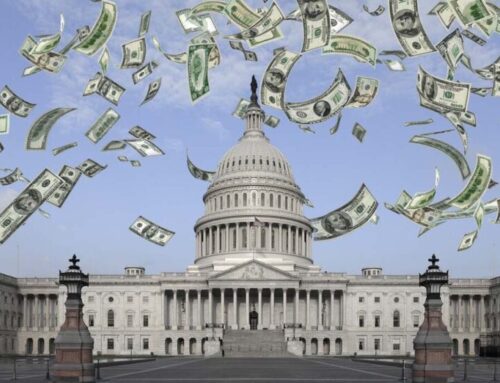[Updated 2/1/2012]
The Natural Resources Committee today passed three energy-related bills today, and the royalties that would result would be used to fund the transportation program. Though it's a few months old, this analysis is still accurate, as nothing in the bills changed relative to the issues discussed below.
For a TCS reaction ot the passage of these bills, see here: Counting on Speculative Oil and Gas Revenues to Fund our Transportation Needs is Fiscally Reckless.
For our analysis of the bills the Committe passed, see below.
——-
The following analysis is from November 17, 2011.
House Speaker John Boehner (R-OH) held a news conference today to express his support for using royalties from increased energy development to pay for an extended reauthorization of the nation’s transportation program. The approach that seems to be winning the day would combine a trio of bills about energy development:
- Rep. Steve Stivers (R-OH) has a bill increasing offshore oil and gas drilling
- Rep. Doug Lamborn (R-CO) has abill increasing oil shale production
- Reps. Doc Hastings (R-WA) and Don Young (R-AK) have a bill allowing for Arctic drilling
All three of these bills are the focus of tomorrow’s Natural Resources Committee hearing that (TCS will be testifying – check back on our website tomorrow for our written remarks).
These bills are among several proposals tying increased drilling and energy development to infrastructure funding.
Leaving aside the unlikelihood that such an approach will ever be enacted; all three bills curiously lack what would seem to be a critical element: a requirement that the collected royalties be used for infrastructure. The bills are completely silent on the issue. The Speaker’s briefing was short of details, so it is entirely possible, if not likely, that his bill (H.R. 7, when introduced) will tie all three together and mandate how the funds are used. But as written, it does not appear the additional royalties (beyond what is paid to the states in the case of the Stivers bill) would have to be used for infrastructure purposes. In fact, only the Stivers bill even mentions infrastructure, and only in the description (“To require the Secretary of the Interior to conduct certain offshore oil and gas lease sales, to provide fair and equitable revenue sharing for all coastal States, to formulate future offshore energy development plans in areas with the most potential, to generate revenue for American infrastructure, and for other purposes.”) and the bill’s name (“American-Made Energy and Infrastructure Jobs Act”).
Regardless of how the Speaker’s bill is structured, paying for transportation system improvements with speculative future energy royalties is unwise. The Stivers bill is worrisome, in part because it would commit a large share of the increased royalties to the states off of which the drilling occurs. Royalties collected from drilling on federal land should go to the Treasury. With a debt that now exceeds $15 trillion, any relief would be welcome. In addition, federal waters are administered, protected, and managed by federal – not state – agencies at a cost to federal taxpayers, and the revenue derived from sale of these resources should be returned to the federal treasury. Unlike onshore energy operations, offshore energy operations do not occur in a state and the impact for operations beyond state waters reaches well beyond any one state and has national implications. Federal taxpayers fund the agencies charged with royalty collection and lease regulations. Additionally, the U.S. Coast Guard, not the states, inspects and regulates the offshore drilling rigs as well as performs vessel regulation, search and rescue, security, and pollution response.
Lamborn's “Protecting Investment in Oil Shale the Next Generation of Environmental, Energy, and Resource Security” Act (“PIONEERS” Act) is even more difficult to understand, especially from the perspective of funding transportation. Oil shale is in its very early stages of development, and it is extremely difficult to determine how much, if any, royalties this will bring in. No country in the world has established a commercially viable oil shale industry. The technology to retrieve oil shale in a cost competitive fashion does not currently exist. In fact, thousands of acres have already been conveyed for shale development, but sit idle. Furthermore, the PIONEERS Act does not guarantee a fair return to taxpayers, further reducing its impact as a source of potential infrastructure funding.
Funding transportation with speculative revenue from future energy development to pay for today’s transportation needs is fiscally foolish and destroys the “user pays” principle upon which our transportation system is based. The connection between these royalties – revenues that should be used to pay down our debt – and transportation infrastructure is specious at best. At worst, it would violate the mandate that 90% of the funds flowing into the Highway Trust Fund – the nation’s transportation bank account – be derived directly from user fees.
TCS has written about this in the past. Here is a portion of a piece from two weeks ago that remains relevant to today’s proposal by the House Speaker.
The House also announced this week its intentions to pass a transportation reauthorization bill by the end of the year. Though the Republicans in charge of that chamber initially indicated they would seek a six-year bill at $230 billion – the amount of revenue expected in the HTF over that time – House leadership recently granted Transportation and Infrastructure Chairman John Mica (R-FL) permission to go fishing for additional revenue. It is expected that they will begin work on a $285 billion bill, which is approximately the same amount in the last reauthorization. And as TCS speculated several weeks ago, House Speaker John Boehner (R-OH) made official this week his intentions to use speculative revenues from increased oil and gas drilling to pay for very real concrete through a larger transportation program. According to the Speaker's release, House Republicans “favor an approach that combines an expansion of American-made energy production with initiatives to repair and improve infrastructure and reform the way infrastructure money is spent.”
Leave aside for a moment that this is a fairly radical departure from the “user pays” principle that the HTF has operated under since its inception – where the system's users (drivers) pay for construction and maintenance of the system. The biggest problem with this approach is the speculative nature of future revenues. Paying for a couple of years of transportation funding with expected revenues from an increase in oil and gas drilling that will likely take many years to get rolling is not a responsible budget approach. It's like buying the Ferrari tomorrow because you are sure a raise is coming sometime in the future. If this sounds like a similar story that got us into our current budgetary quagmire, you'd be right.
On a final note, the House proposal will turn on its head the user pays principle which has guided transportation spending over the last 50 years. Not only will this further divorce in the public's mind the importance of funding the program from the system's maintenance, there are major practical issues as well. Transportation spending holds a special place in federal budgeting. Gas taxes are walled-off for use only on transportation projects, but changes to budgeting procedures in 1974 mandated that for that special exception to remain, more than 90 percent of the funds flowing into the HTF must be from direct user fees. A tax on oil and gas drilling is hardly a direct user fee, and this funding will make up far more than ten percent of transportation funding. It is unclear how this issue will be handled.
We feel that Congress either needs to find real offsets or revenue increases to pay for the nation's transportation system or constrain spending to what we can expect through gasoline tax increases. We fear that what we're going to get, however, are budgetary smoke and mirrors that make it look like we have money to burn but drive up the deficit even further. In addition, for the long-term health of the HTF, the Senate should resist the urge to spend the balance down to zero, or we're likely to find ourselves in a similarly precarious position in the not so distant future.











Get Social